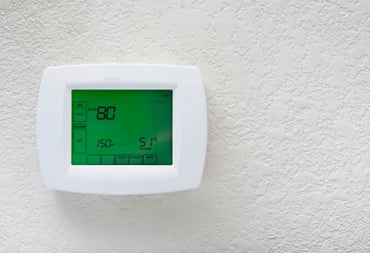Why Your Air Conditioning Thermostat Set at 78, Won't Cool Below 80
[fa icon="calendar"] July 30, 2019 / by Home Services Expert
 "Is it hot in here or is it just me?" This thought may have crossed your mind enough lately that you have to do a double take when checking your thermostat. You've looked once, given it time, checked it again and there's no denying what you can plainly see with your own two eyes: your thermostat registers 80 degrees but you have it set at 78 degrees.
"Is it hot in here or is it just me?" This thought may have crossed your mind enough lately that you have to do a double take when checking your thermostat. You've looked once, given it time, checked it again and there's no denying what you can plainly see with your own two eyes: your thermostat registers 80 degrees but you have it set at 78 degrees.
Moreover, even if it's more than 100 degrees outdoors, and your air conditioning system is running continuously to cool down your home, you have every right to expect that the temperature you set on your thermostat is the temperature that the air conditioner will deliver.
Clearly, something is wrong. Pinpointing the reason is, like many issues with air conditioners, a process of elimination. So let's take it from the top and review probable causes that you can rectify and probable causes that only technicians from air conditioning services companies can solve on your behalf.
Check the filter
As we've said many times, that soft, meshy device provides some hard reinforcement to your air conditioner. In this case, if a filter is loaded with dust and dirt, it could be interfering with your air conditioner's ability to cool your home. Now might well be the time to pop in a fresh filter.
Check the thermostat's power source after ensuring that it's set to "cooling" mode
If your thermostat is hard-wired, check the fuse or circuit breaker; if it's battery-operated, replace the batteries. If these steps check out, the National Association of Certified Home Inspectors recommends testing the thermostat's integrity by taping a thermometer next to the thermostat and waiting 15 minutes. If the thermometer registers a different reading from that of the thermostat, it might need to be re-calibrated.
Inspect the area around your condenser
This is the outdoor portion of your air conditioning system. Remove obstructions that could be blocking air flow, including leaves, branches, furniture and toys. If your condenser is located in a heavily landscaped region of your yard, make a point to keep the perimeter around the condenser “tamed” and well-trimmed. While outdoors, check for a puddle of water or even a drenched area near the condenser that leads you to believe a puddle recently formed there. Water signifies that you might have a blocked drain line or a crack in the condensate pan or drain line.
How Experts In Your Home Can Help
When your home isn't cooling as you expect it to, we'll check:
- Refrigerant issues, including low refrigerant or a leak.
- The general condition of your air conditioning system. If it's been more than one year since your last air conditioner tune-up, your air conditioner might be putting out a call for help by failing to cool your home as you want it to. Cleaning the coils and compressor can do wonders for improving the efficiency of an air conditioner; so can lubricating the moving parts and making adjustments to sluggish electrical connections. We'll do all that and more, as recommended by the U.S. Department of Energy.
- Leaky duct work, which can range from small cracks to loose and faulty connections. Ducts can be deceptive; they often look sturdy to the naked eye but can be the reason why you're losing up to 20 percent of the cool air you're paying for. (And that's an estimate that comes straight from the U.S. Department of Energy.) Experts In Your Home will inspect your ducts methodically to see if they should be repaired or fortified.
- The age of your air conditioner. If it's past the 10-year mark, it's entering the last phase of its projected lifespan of 15 to 20 years and could be struggling to cool your home. Purchasing a new one might not be on your radar screen, but we will help you compute a cost analysis. It could be well worth your while, especially because the department of energy says that “even if your air conditioner is only 10 years old, you may save 20 percent to 40 percent of your cooling energy costs by replacing it with a newer, more efficient model.”
- The size of your air conditioning system in relation to the cooling load you're placing on it every month. It doesn't happen often, but every once in a while, Experts In Your Home comes across a home whose air conditioner is simply too small for the space it is intended to cool.
Rest assured that Experts In Your Home will get to the bottom of why your thermostat and home temperature are out of sync. Contact us today - we do more than you think!



